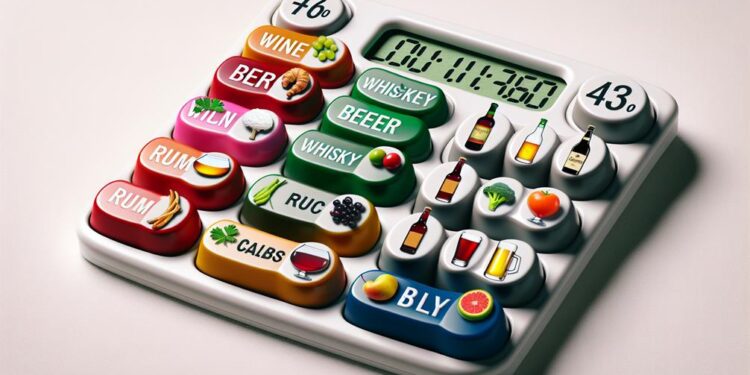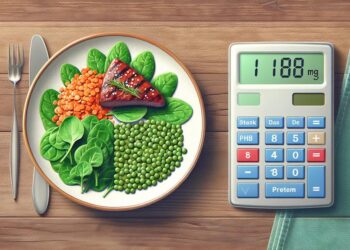Calories from Alcohol Calculator
When tracking your nutrition, you meticulously monitor your food intake, but what about those sneaky calories from alcohol? They often go unnoticed but can significantly impact your diet. Imagine being able to precisely calculate the caloric content of your favorite drinks and better understand how they fit into your daily intake. The Calories From Alcohol Calculator offers an eye-opening perspective on the impact of those liquid calories. Let's explore how this tool can shed light on your alcohol consumption habits and help you make more informed dietary choices.
Key Takeaways
- Alcohol calories are 'empty calories' with little nutritional value.
- Excessive alcohol intake can hinder weight loss efforts.
- Being aware of alcohol's impact helps make informed dietary choices.
- Consistency in using the calculator is key for tracking progress.
Understanding Alcohol Calories
Understanding how alcohol contributes to your daily calorie intake can be eye-opening for many individuals looking to manage their diet effectively. When it comes to weight loss, alcohol consumption plays a significant role that is often underestimated. Each gram of alcohol provides 7 calories, which is almost as much as fat, making it a dense source of energy. Furthermore, the calories from alcohol are considered "empty calories" as they provide little to no nutritional value.
While moderate alcohol consumption may have some health benefits, excessive intake can hinder weight loss efforts. Not only does alcohol itself contribute to calorie intake, but it can also lead to poor food choices and overeating. Additionally, the body processes alcohol before other nutrients, potentially storing excess calories as fat. Being mindful of your alcohol consumption and its impact on your daily calorie intake is crucial for achieving your weight loss goals. It may be helpful to track your alcohol consumption along with your food intake to get a clear picture of how it fits into your overall diet.
Impact on Daily Caloric Intake
Considering the impact of alcohol on your daily caloric intake is crucial for maintaining a balanced diet and achieving your health goals. Alcohol can significantly contribute to your overall caloric balance, affecting weight management. Each gram of alcohol provides 7 calories, almost as much as fat, which contains 9 calories per gram. These alcohol calories are often referred to as "empty calories," as they provide energy but lack essential nutrients. When consumed in excess, these additional calories can lead to weight gain and interfere with your weight management efforts. It's important to be mindful of the caloric content of alcoholic beverages and factor them into your daily caloric intake to maintain a healthy balance. By being aware of the impact of alcohol on your caloric intake, you can make informed choices that align with your health and wellness objectives.
Comparing Different Alcoholic Beverages

When comparing different alcoholic beverages, it's important to note the varying caloric content to make informed choices for your diet and health goals. Understanding the nutritional value of different alcoholic drinks can help you manage your calorie intake more effectively. Here are some key points to consider:
- Caloric Variability: Alcoholic beverages can vary significantly in their caloric content. For example, a standard beer typically contains fewer calories than a sugary cocktail.
- Nutrient Density: Different alcoholic drinks offer varying levels of nutritional value. For instance, red wine contains antioxidants that may have health benefits when consumed in moderation.
- Alcohol Content: Be mindful of the alcohol by volume (ABV) percentage in different beverages, as this affects both the strength of the drink and its caloric content.
- Mixers Matter: If you enjoy mixed drinks, remember that the mixers used can significantly increase the calorie count. Opting for low-calorie mixers can help manage your overall intake.
- Alcohol Consumption Trends: Consider your own alcohol consumption trends and preferences when choosing beverages to ensure they align with your health and wellness goals.
Tips for Managing Alcohol Consumption
To effectively manage your alcohol consumption and support your health goals, it is important to implement practical strategies that promote mindful drinking habits. When it comes to moderation techniques, consider setting limits before you start drinking, alternating alcoholic beverages with water, and being mindful of portion sizes. Additionally, in social settings, try to surround yourself with supportive friends who respect your drinking choices and opt for non-alcoholic alternatives when possible.
| Moderation Techniques | Social Settings |
|---|---|
| Set limits before drinking | Surround yourself with supportive friends |
| Alternate with water | Opt for non-alcoholic alternatives |
| Mindful portion sizes | Communicate your limits clearly |
| Know your limits | Plan activities that don't revolve around drinking |
Utilizing the Calories From Alcohol Calculator
Have you ever wondered how to accurately track the calories you consume from alcohol? Utilizing a Calories From Alcohol Calculator can help you stay informed about the impact of your drinking habits on your diet. Here are some tips to make the most of this tool:
- Input Accurate Information: Ensure you are entering the correct type of alcohol, serving size, and quantity to get an accurate calorie count.
- Track Your Progress: Use the calculator regularly to monitor your alcohol-related calorie intake and see how it aligns with your overall dietary goals.
- Set Realistic Goals: Based on the calorie information provided by the calculator, establish realistic goals for your alcohol consumption to better manage your diet.
- Adjust as Needed: If you find that your alcohol consumption is hindering your progress, consider adjusting your intake or seeking support to reach your goals.
- Stay Consistent: Consistency is key in tracking progress and achieving your desired outcomes, so make using the calculator a routine part of your dietary monitoring.
Frequently Asked Questions
Can Consuming Alcohol on an Empty Stomach Affect How Many Calories Are Absorbed by the Body?
Consuming alcohol on an empty stomach can increase caloric absorption as it gets metabolized quickly. Fasting effects can lead to a faster and more direct absorption of alcohol, potentially impacting your body's calorie intake.
Are There Certain Types of Alcoholic Beverages That Are Better for Weight Management Than Others?
When considering weight management, opt for wine over beer as it usually contains fewer calories. Choose liquor like vodka or gin with low-calorie mixers to limit calorie intake. Moderation is key in balancing alcohol consumption with a healthy diet.
How Does Alcohol Consumption Impact Metabolism and the Body's Ability to Burn Calories?
Alcohol metabolism affects your calorie burning efficiency. When consumed on an empty stomach, absorption is quicker, impacting weight management. Tracking accuracy is crucial due to hidden calories. Health risks arise from excessive intake, affecting overall well-being.
Is It Possible to Accurately Track the Calories Consumed From Mixed Drinks or Cocktails?
You can accurately track the calories consumed from mixed drinks or cocktails by checking the ingredients used, portion sizes, and utilizing online resources or apps. Measuring the impact of these drinks on your diet helps in making informed choices.
Are There Any Health Risks Associated With Regularly Consuming Alcohol as Part of a Diet Plan?
Regularly consuming alcohol as part of a diet plan can harm your liver health. The liver metabolizes alcohol, and excessive intake can lead to fatty liver disease. Over time, alcohol tolerance may increase, requiring higher quantities for the same effect.
Conclusion
In conclusion, understanding the impact of alcohol calories on your diet is crucial for managing your overall caloric intake. By comparing different alcoholic beverages and utilizing a calories from alcohol calculator, you can make informed decisions about your consumption. Remember, moderation is key in maintaining a balanced diet and reaching your health goals. So, sip smartly and stay in control of your calorie consumption to achieve a healthier lifestyle.












